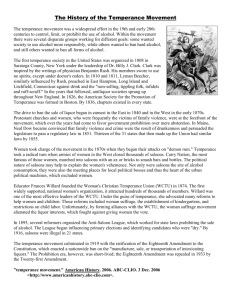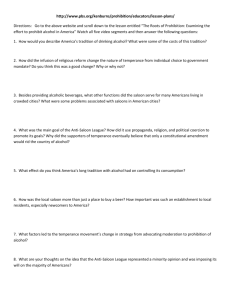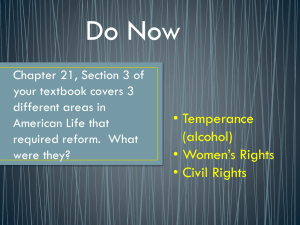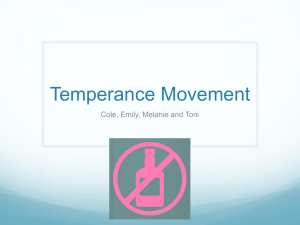Carrie Nation Biography
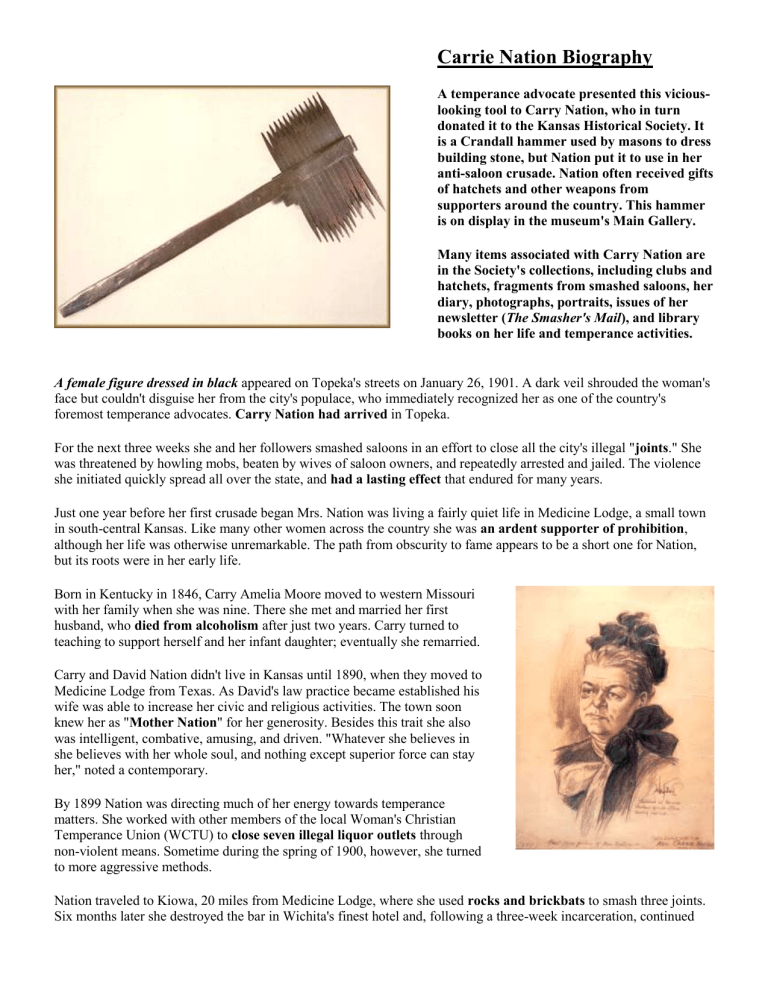
Carrie Nation Biography
A temperance advocate presented this viciouslooking tool to Carry Nation, who in turn donated it to the Kansas Historical Society. It is a Crandall hammer used by masons to dress building stone, but Nation put it to use in her anti-saloon crusade. Nation often received gifts of hatchets and other weapons from supporters around the country. This hammer is on display in the museum's Main Gallery.
Many items associated with Carry Nation are in the Society's collections, including clubs and hatchets, fragments from smashed saloons, her diary, photographs, portraits, issues of her newsletter (The Smasher's Mail), and library books on her life and temperance activities.
A female figure dressed in black appeared on Topeka's streets on January 26, 1901. A dark veil shrouded the woman's face but couldn't disguise her from the city's populace, who immediately recognized her as one of the country's foremost temperance advocates. Carry Nation had arrived in Topeka.
For the next three weeks she and her followers smashed saloons in an effort to close all the city's illegal " joints ." She was threatened by howling mobs, beaten by wives of saloon owners, and repeatedly arrested and jailed. The violence she initiated quickly spread all over the state, and had a lasting effect that endured for many years.
Just one year before her first crusade began Mrs. Nation was living a fairly quiet life in Medicine Lodge, a small town in south-central Kansas. Like many other women across the country she was an ardent supporter of prohibition , although her life was otherwise unremarkable. The path from obscurity to fame appears to be a short one for Nation, but its roots were in her early life.
Born in Kentucky in 1846, Carry Amelia Moore moved to western Missouri with her family when she was nine. There she met and married her first husband, who died from alcoholism after just two years. Carry turned to teaching to support herself and her infant daughter; eventually she remarried.
Carry and David Nation didn't live in Kansas until 1890, when they moved to
Medicine Lodge from Texas. As David's law practice became established his wife was able to increase her civic and religious activities. The town soon knew her as " Mother Nation " for her generosity. Besides this trait she also was intelligent, combative, amusing, and driven. "Whatever she believes in she believes with her whole soul, and nothing except superior force can stay her," noted a contemporary.
By 1899 Nation was directing much of her energy towards temperance matters. She worked with other members of the local Woman's Christian
Temperance Union (WCTU) to close seven illegal liquor outlets through non-violent means. Sometime during the spring of 1900, however, she turned to more aggressive methods.
Nation traveled to Kiowa, 20 miles from Medicine Lodge, where she used rocks and brickbats to smash three joints.
Six months later she destroyed the bar in Wichita's finest hotel and, following a three-week incarceration, continued
the crusade until she was rearrested. Next she traveled to Enterprise (another small town) at the invitation of a leading citizen. After two riotous days she left for Topeka.
Kansas had been the first state in the nation to prohibit alcoholic beverages by constitutional amendment in 1880.
Ten years of political and legal battles followed before open saloons disappeared from Kansas. In 1890 temperance suffered a blow when the United States Supreme Court permitted selling in "original packages." A troubled economy and lax law enforcement allowed saloons or "joints" to reappear all over the state.
By the turn of the century members of Kansas temperance organizations had high hopes for change. In 1901 temperance leaders assembled in Topeka for the annual convention of the Kansas State Temperance Union (KSTU).
Leaders of the KSTU had mixed feelings about Nation attending the meeting. They did not invite her, but Nation appeared and was enthusiastically received by the delegates.
After the convention Nation organized several hundred Kansas women (and some men) into bands of "Home
Defenders." Home Defender buttons and pins were sold at temperance meetings to raise funds for the cause. She accepted many speaking engagements and conducted meetings at which she advised those in attendance, "Oh, I tell you, ladies, you never know what joy it gives you to start out to smash a rumshop." To those who could not secure a hatchet for the upcoming battle she said, "pokers will do as well."
On February 4 a brigade of Home Defenders attempted to rush a joint but was turned back by a large crowd. The next day Nation and her followers attacked the Senate Saloon , the finest local establishment. Slot machines, a cash register, and fixtures were damaged or destroyed.
Many leading men rallied to Nation's cause in the hours following the Senate scuffle, and the police chief decided to close all joints and call a council of male citizens to debate the matter. He set the meeting for a date when Nation was on a speaking tour in Iowa and Illinois.
Nation returned to Topeka to find Home Defenders angry at being excluded from the meeting and distressed that joint owners had been allowed to keep their bar equipment. On Feb. 17 the crusaders spent the day destroying a leading joint and smashing bar fixtures in storage. Many were arrested , Nation among them.
Following the lead of the Topeka brigade, Home Defenders all over the state took action against their local joints. The
KSTU and Nation intensively lobbied members of the 1901 legislature, who were well aware of the violence in their communities. "If you don't do it, then the women of this state will do it," Nation told the Senate, and to the House she said, "You refused me the vote and I had to use a rock ." They responded by passing the first significant temperance legislation in almost 15 years. Although another five years passed before the authorities systematically enforced the law, this second era of prohibition in Kansas was much more rigorous and long-lived than the first.
By March 1901 the atmosphere in Kansas had calmed considerably. Nation, who had gained national attention , traveled widely delivering lectures and making personal appearances. She continued to call Topeka home until 1905 when she moved to Oklahoma Territory and helped that state enter the nation with a dry constitution. Following an extensive European tour in 1908-9, Nation lived briefly in Washington, D.C. before settling in Arkansas. She died on
June 9, 1911, at 65 years of age.
